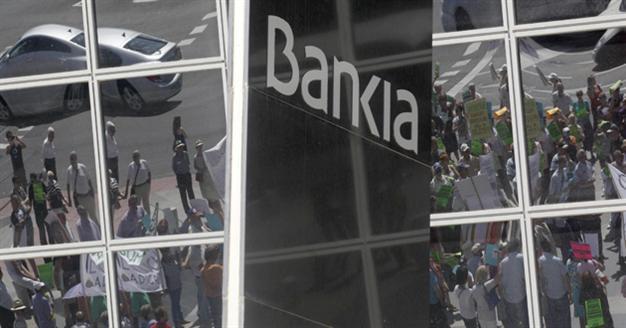Spain formally requests banking aid
MADRID - Agence France-Presse

Minority shareholders protesting against the abuses of banks and saving banks are reflected on the headquarters of Spain's lender bank Bankia in Madrid June 23, 2012. REUTERS photo
Spain formally sought a
banking rescue of up to 100 billion euros today, kicking off a pivotal week in the battle for the eurozone's future.
The plea to Spain's eurozone partners shed little new light on how the help will be delivered to the banks, hobbled by huge, reckless loans that turned sour after a property bubble imploded in 2008.
It came at a key moment in the eurozone crisis after debt markets pushed Spanish and Italian 10-year borrowing rates well above six percent and raised concerns for the future of the currency union itself.
A full-blown bailout for Spain, the fourth-largest economy in the eurozone, would dwarf the rescues of Ireland, Greece and Portugal and strain the resources of the bloc to the limit.
"Whether Spain will also need full-fledged financial support beyond the bank programme will depend on its ability to retain market access," said Antonio Garcia Pascual, analyst at Barclays Research.
"This in turn depends on both Spain's policy commitments and, to a greater extent, on the speed with which Europe's decisions evolve towards greater financial and fiscal integration in the coming days and weeks." European Union leaders prepared for a two-day summit from Thursday, when they will consider deepening economic and monetary union in the 17-nation eurozone.
A 10-page draft blueprint for discussion at the summit charts a route to banking union, direct eurozone intervention in troubled banks, and an option to issue mutualized debt, said a Financial Times report.
Leaders will also have to decide how to respond to demands from Greece's new government for new terms on its bailout, including a two-year deadline extension on reforms.
Eurozone finance and economy ministers, who make up the Eurogroup, will consider Spain's plight separately on July 9.
In a letter to Eurogroup head Jean-Claude Juncker, Economy Minister Luis de Guindos said Spain would offer all its help to reach a draft loan agreement in time for the Eurogroup meeting.
There has been no decision yet on the loan amount, though Eurogroup ministers have offered up to 100 billion euros, and consultants hired by Madrid estimated that the banks need up to 62 billion euros in capital.
Eurozone powers must still decide how to disburse the money, who will be eligible, what conditions are to be imposed, and the terms of the loan contract.
"The important thing for us is the timetable for repayment and interest rates," Spanish Foreign Minister Jose Manuel Garcia-Margallo told reporters in Luxembourg.
"If we have a long repayment schedule and a low interest rate, the deal would be much more favorable," he said.
Investors have shown concern that the rescue loan might be delivered through the European Stability Mechanism, which has priority over ordinary investors in case of a default.
Spain has argued in favour of eurozone powers lending money directly to the banks, thus avoiding increasing Madrid's sovereign debt burden. If Spain took out the full 100 billion euros, its public debt would grow by about 10 percentage points to reach 90 percent of economic output by the end of this year, analysts say.
"The question is still open over whether the help will go directly to the banks or through the state," Margallo said. The option of direct intervention in the banks was discussed in a Rome summit on Friday of the leaders of Germany, Spain, Italy and France but no decision was reached, he added.
Friday's summit agreed instead on a 130-billion-euro economic stimulus package for the eurozone.
Though Europe dodged the immediate threat of a Greek exit from the eurozone when pro-bailout parties managed to form a government last week, Athens is now pushing for easier terms.
Greece's new three-party coalition headed for a showdown with a "troika" of international creditors - the European Union, IMF and European Central Bank - over its bid to revise an austerity-centred bailout.
Originally due on Monday, however, the auditors' visit has been delayed with no new date yet set, a government official said. Prime Minister Antonis Samaras underwent major eye surgery on Saturday and is expected to stay at home for at least a week.
debt crisis,
